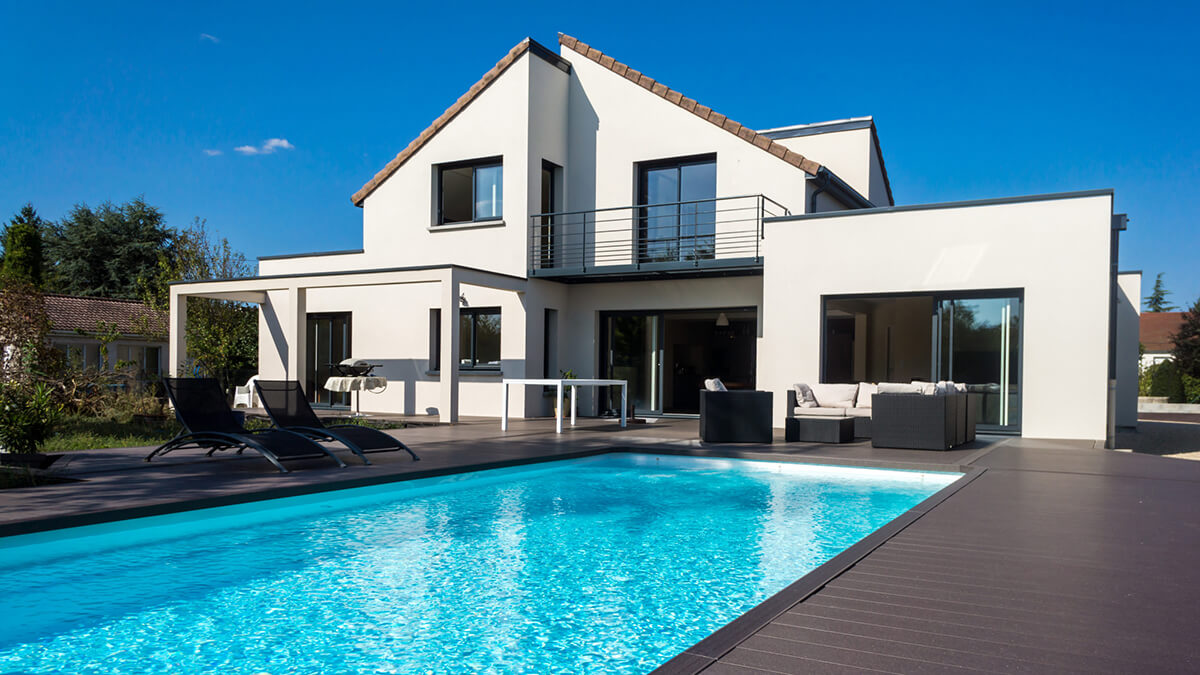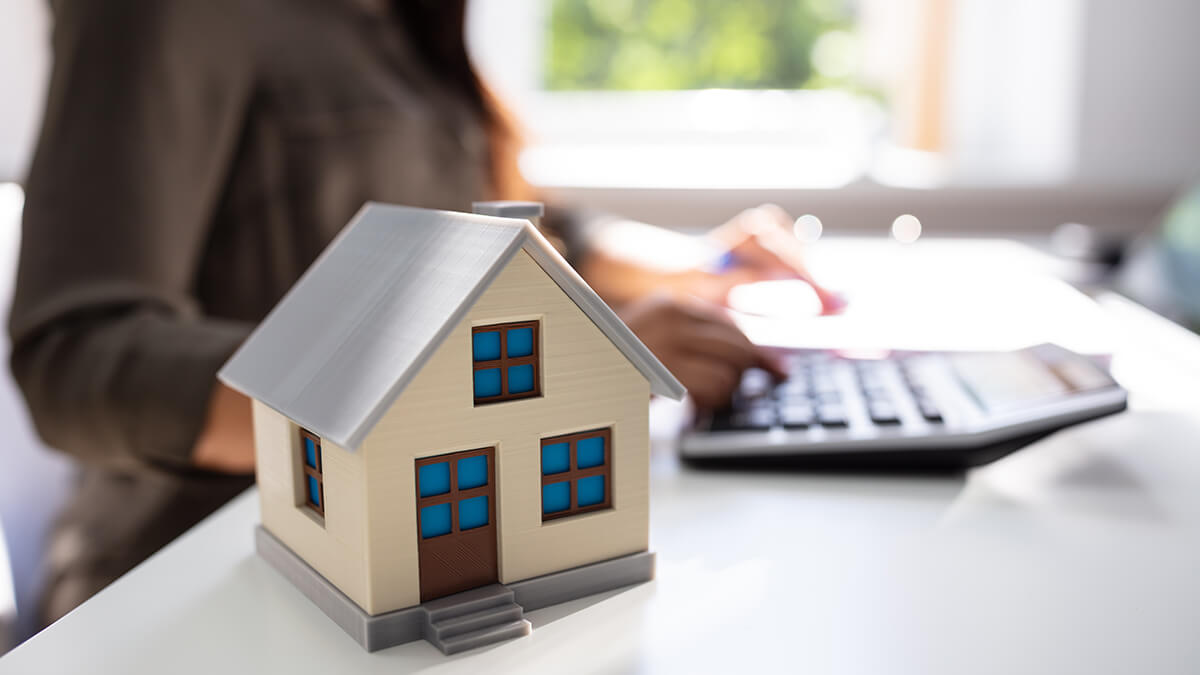Installing a pool typically increases home value, but a common question is whether it’s worth the investment. Inground pools, for example, can increase your home’s value up to 7% but rarely recoup the full cost of installation or upkeep, while above-ground pools don’t add as much and can even be seen as a liability in some markets.
This guide will cover some of the factors that can affect how much value a pool adds to a property, including quality, location, market demand, and climate.
For homeowners looking to sell without making costly additions to their home, iBuyer.com can connect sellers with cash buyers looking to purchase homes as-is. Enter your home address now for a free valuation and see how you can save on your home sale.
Adding a Pool To Your Home
Compare Cash Offers from Top Home Buyers. Delivered by Your Local iBuyer Certified Specialist.
One Expert, Multiple Offers, No Obligation.
Does a swimming pool add value to your home?
Real estate experts estimate that an average 16×32-foot inground concrete pool can potentially add 6 to 10 percent to the value of your home. For example, if your property is valued at $350,000, a pool could increase its value by approximately $21,000 to $35,000.
However, the exact value added can vary based on factors such as location, the quality of the pool, and market demand.
Does an above ground pool increase home value?
Above-ground pools have been a bit of a pandemic craze as country clubs and public pools shut down across the country. Inspired to improve their quality of life while spending a lot more time at home than usual, many Americans chose to install above-ground pools to help them have a refreshing and cool summer.
When compared to inground pools, above-ground pools aren’t seen as being nearly as upscale or sophisticated. However, some families might be appreciative of it as a feature regardless.
One of the biggest factors that can determine whether or not an above-ground pool will increase your home value is the quality. Some of these pools are built to serve as an extension of the home, while others look more like an afterthought. This will have an impact on whether or not you see any return on investment from the install and maintenance costs.
The location also matters when it comes to this question. In places where there are warm temperatures year-round (think Florida,) an above-ground pool can potentially add value. If this isn’t the case, homebuyers might feel like the amenity isn’t essential and actually sacrifices valuable yard space.
Above-ground pools aren’t allowed in many homeowners’ associations. You typically find this style of pool in rural settings and older neighborhoods.
If you choose to get an above-ground pool, think of it as an investment in your own enjoyment rather than as a scheme to increase your home value.
Does an in-ground pool increase home value?
Inground pools do typically increase your property value but read on before you start scheduling quotes from local pool installers. Though it might increase the value of your home, you still might not recoup your investment.
In ideal circumstances, installing an inground pool can boost the value of your house by as much as 7%. Considering how much it costs to install a pool, this means that you likely won’t increase your home’s value as much as it cost you to install the pool.
You can’t sidestep this issue if you build a pool that is too elaborate or fancy when compared to your home, either. This will actually mean that you recoup less of the costs rather than proportionately increasing your home value.
The other thing to factor in is how much it costs to maintain pools, which is typically significant. With other home improvements, such as remodeling your kitchen or adding an additional room, you don’t have to factor in additional maintenance costs.
There are a number of other ways to add value to your home if that is your primary interest. Landscaping, minor bathroom remodels, and minor kitchen remodels can all recoup roughly 100% of your investment, for example.
If you’re looking to make upgrades and repairs to your home specifically to increase the value, check out this article.
How much value does a pool add to a home?
There isn’t a simple answer to how much value is added to a home with the addition of an inground pool. Some reports say that the average increase you can expect is between 5 and 8 percent, while another study suggests that 7 percent is the best you’re going to do.
The location of your home can make a big difference when it comes to answering this question. In places where there are less than the average number of pools, the value of the home could increase impressively because they have something unique to offer on the market. This can also be a popular amenity in places where there are lots of families with school-age children.
However, if your pool is maintained poorly or needs maintenance or repairs, it can actually deter buyers and reduce your home value.
You might consider hiring a professional appraiser if you are thinking about building a pool and are concerned with its impact on the value of the home. They will be able to help estimate how much of an increase, if any, you can expect for your home’s value. You can then weigh out whether or not this works for your specific needs.
(If you’re thinking about selling your home but have no idea how much your house is worth, take a look at this handy guide.)
Cost to install a pool
To install a fiberglass inground pool, the average cost including materials and labor can range between $20,000 and $60,000. For a pool made from gunite or concrete, the average cost is between $35,000 and $100,000.
As you can see, an inground pool comes with a hefty price tag. Above-ground models, on the other hand, can cost between $1,500 and $15,000.
Above-ground pools don’t tend to last as long as inground pools. This is something you will want to factor in when deciding what type of pool would work best for your property if you do choose to have one installed.
Cost to maintain a pool
Having a pool isn’t cheap even once the install is over with. The average cost per year for basic pool maintenance ranges between $1,200 and $1,800. When you add in utility and repair costs, the amount you spend per year can end up totally between $3,000 and $5,000.
Pool upkeep includes:
- Buying and adding chemicals to prevent algae growth and maintain proper pH levels
- Having the pool cleaned and vacuumed regularly during months your pool is open
- Purchasing accessories like leaf skimmers, attachable brushes, and telescoping poles
If you hire a pool service, your maintenance costs will be quite a bit higher than if you do this maintenance yourself. Saltwater pools can also have lower maintenance costs than chlorine pools.
Cost to insure a pool
One thing that people often don’t think about when they are considering getting a pool is that it will likely raise their homeowner’s insurance premiums. It is common for policies to cover up to 10% of the replacement cost of pools and other external structures. They also typically cover at least part of most accidents related to swimming pools.
Liability is still something you will want to think about when getting a pool. If you weren’t providing a safe swimming environment, you can be held legally accountable if someone is injured or dies.
Most homeowner’s insurance policies require that you don’t have a diving board and that you install a fence around the pool to help prevent accidents.
How to finance a pool
Building a pool is a big expense, so there’s a good chance that you are interested in borrowing money in order to make your dream a reality. Borrowing money is cheap right now because interest rates are hovering down around historic lows.
Some of the different pool financing options you might consider if you qualify include:
- Apply for a home equity loan: This allows you to take out a fixed-rate second mortgage to pull equity from your home
- Apply for a cash-out refinance: This lets you take extra cash home by tapping into your home’s equity
- Apply for a personal loan: This type of loan might have a higher interest rate but doesn’t tap into your equity and doesn’t require collateral
- Apply for a credit card: This might be a reasonable choice if you don’t qualify for any of the other options and can qualify for a zero-to-low rate card
- Apply for a home equity line of credit: This allows you to draw from an adjustable-rate line of credit when you need it up to a certain limit
As you can see, there are a number of ways to make your backyard pool dreams come to life.
Do buyers see a pool as a feature or an obstacle?
While some buyers might consider an inground pool a luxury, many might simply see it as a liability. There are a number of factors that can coalesce to mean that you can increase your home value by as much as 7%, which include:
- The home is in a higher-end neighborhood where it is the standard to have a pool
- You live in a climate where a pool can be enjoyed year-round, such as Arizona, Hawaii, or Florida
- The pool is well-maintained and the style of the pool fits well with your neighborhood and home
- The pool doesn’t consume all of the space in the yard and leaves space for other features like a garden or swingset
- You are able to attract a buyer that is looking to have a pool
If you really want to add a pool to your home, there’s nothing wrong with that. However, a better way to look at it is as an investment in your lifestyle rather than in your home. When you have a pool it can make your home a more enjoyable place to be, which is something you really can’t put a price on.
You will simply want to be prepared for the responsibility and costs that come along with maintaining a pool as well as the fact that it could deter some buyers if you choose to sell your home in the future.
How much is your home worth?
So, does a pool increase home value? An inground pool can increase the value of your home, but you’re unlikely to recoup the costs of installing, maintaining, and repairing the pool.
That doesn’t mean you definitely shouldn’t install a pool. However, if you choose to do so, it should be because it would increase the quality of life for your family rather than out of the hope that it would increase your home value.
Are you starting to think about selling your house but aren’t looking forward to the headache that is listing your house on the open market? If so, you might be curious to learn about the potential of selling your house to an iBuyer. When you go this route, the process is much more simple, straightforward, and fast.
When you accept a cash offer from an iBuyer, it means that you don’t have to deal with any repairs, showings, open houses, or stagings. You also don’t have to lose sleep at night for months worrying that the buyers’ financing won’t pull through.
Are you wondering how much your home might be worth? If so, you can find out right here!
Instant Valuation, Confidential Deals with a Certified iBuyer.com Specialist.
Sell Smart, Sell Fast, Get Sold. No Obligations.
Reilly Dzurick is a seasoned real estate agent at Get Land Florida, bringing over six years of industry experience to the vibrant Vero Beach market. She is known for her deep understanding of local real estate trends and her dedication to helping clients find their dream properties. Reilly’s journey in real estate is complemented by her academic background in Public Relations, Advertising, and Applied Communication from the University of North Florida.




